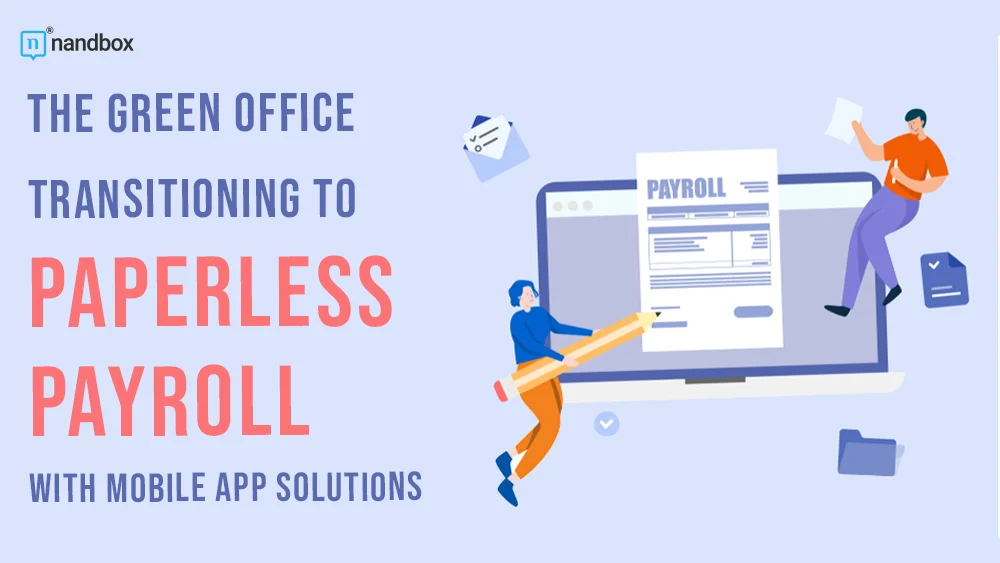Embracing Digital Transformation to Foster Environmental Sustainability
In an era where environmental sustainability is not just a choice but a responsibility, companies are increasingly turning to innovative solutions to minimize their carbon footprint. One such step forward is the transition to paperless payroll systems facilitated by mobile app solutions, marking a significant leap towards eco-friendly business practices.
Introduction
The traditional payroll process, laden with paperwork, has long been an overlooked contributor to environmental degradation. The move towards paperless payroll systems using mobile apps represents a critical step in reducing corporate carbon footprints. This transition not only aligns with global sustainability goals but also introduces efficiency, security, and accessibility in managing employee compensation. In this article, we explore the environmental and operational benefits of adopting digital paystub solutions and how businesses can seamlessly make this eco-conscious shift.
Embracing the Digital Leap
The Environmental Impact of Paper Payroll
The traditional payroll method consumes vast amounts of paper, contributing significantly to deforestation and greenhouse gas emissions. The production, transportation, and disposal of paper paystubs entail a considerable environmental cost. By transitioning to digital paystubs and learning how to generate pay stub efficiently, companies can dramatically reduce their paper usage, thereby conserving natural resources and mitigating their environmental impact. For multinational corporations, adopting a global payroll system ensures streamlined payroll operations across different regions while reinforcing sustainability efforts by eliminating paper waste on a larger scale.
Efficiency and Security Benefits
Beyond the environmental benefits, digital payroll solutions offer enhanced efficiency and security. Mobile payroll apps streamline the payroll process, reducing the likelihood of errors and saving time for HR departments. Furthermore, digital paystubs are less susceptible to theft or loss, offering a secure alternative to paper checks. Encryption and secure login protocols protect sensitive information, giving employees peace of mind about their personal data.
Implementing Mobile App Solutions
Choosing the Right Platform
Selecting the appropriate mobile payroll application is crucial for a smooth transition. Companies should consider factors such as user-friendliness, compatibility with existing HR systems, security features, and customer support. Opting for a platform that offers an intuitive interface and comprehensive functionality can ensure a positive user experience for both HR managers and employees.
Training and Support
To maximize the benefits of paperless payroll, companies should provide thorough training and support to their employees. Educating staff on how to use the new system effectively can mitigate resistance to change and encourage adoption. Additionally, offering ongoing support can help address any technical issues promptly, ensuring a seamless payroll experience.
Success Stories of Transition
Numerous companies across various industries have successfully transitioned to paperless payroll, reaping both environmental and operational benefits. For instance, a major retail chain reported a 75% reduction in paper use within a year of implementing a mobile payroll solution. Moreover, employees expressed high satisfaction with the ease of accessing their pay information securely on their mobile devices. Such success stories highlight the tangible benefits of embracing digital payroll solutions and serve as a model for other businesses looking to make an eco-friendly shift.
Making the Eco-Conscious Shift
Promoting Environmental Awareness
For companies embarking on the transition to paperless payroll, fostering a culture of environmental awareness is essential. Encouraging employees to recognize the environmental impact of their actions and the benefits of digital alternatives can cultivate a collective commitment to sustainability. This shift in mindset is crucial for the successful adoption of paperless systems.
Continuous Improvement and Innovation
The journey towards environmental sustainability does not end with the transition to paperless payroll. Companies should continually seek ways to improve and innovate their processes to further reduce their environmental impact. This might include adopting other paperless solutions, such as digital contracts and receipts, or exploring renewable energy sources for their operations. The goal is to create a sustainable business model that can adapt to the evolving demands of environmental stewardship.
The Role of Corporate Social Responsibility
In today’s market, a company’s commitment to sustainability significantly influences its brand perception and competitiveness. Adopting paperless payroll systems as part of a broader corporate social responsibility (CSR) strategy showcases a firm’s dedication to environmental stewardship. This commitment not only appeals to environmentally conscious consumers but also attracts and retains employees who value sustainability. Companies can leverage their transition to paperless payroll in their marketing and recruitment efforts, highlighting their role in combating climate change and promoting a sustainable future.
Conclusion
Transitioning to paperless payroll through mobile app solutions is a significant step towards achieving environmental sustainability in the corporate world. This shift not only reduces the environmental impact of traditional payroll processes but also enhances operational efficiency and security. By selecting the right platform, providing adequate training, and fostering a culture of environmental awareness, companies can successfully navigate this eco-conscious transition. As more businesses embrace digital payroll solutions, we move closer to a greener, more sustainable future.




